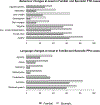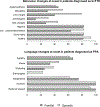Clinical and genetic analyses of familial and sporadic frontotemporal dementia patients in Southern Italy
- PMID: 28264768
- PMCID: PMC6232845
- DOI: 10.1016/j.jalz.2017.01.011
Clinical and genetic analyses of familial and sporadic frontotemporal dementia patients in Southern Italy
Abstract
Introduction: We investigated the clinical differences between familial and sporadic frontotemporal dementia (FTD), screening for mutations in known FTD genes.
Methods: We diagnosed 22 affected individuals belonging to eight families and 43 sporadic cases with FTD in Apulia, Southern Italy, in 2 years. Mutations in common causative FTD genes (GRN, MAPT, VCP, and TARDBP) and C9ORF72 expansions were screened.
Results: Behavioral variant of FTD was the most common clinical subtype (50% and 69% in familial and sporadic cases, respectively). Social conduct impairment/disinhibition, loss of insight, and inflexibility were the most frequent clinical features observed at onset. One new mutation was identified in GRN in family A.
Discussion: Disease onset in sporadic FTD was more frequently characterized by a clustering of behavioral symptoms with apathy and loss of personal hygiene. Mutations in common causative FTD genes are not a major cause of familial and sporadic FTD in the Southern Italian population.
Keywords: Behavioral variant of FTD; Frontotemporal dementia; Primary progressive aphasia: familial; Semantic dementia; Sporadic.
Copyright © 2017. Published by Elsevier Inc.
Figures











References
-
- Neary D, Snowden J, Mann D. Frontotemporal dementia. Lancet Neurol 2005; 4:771–80. - PubMed
-
- Grossman M Frontotemporal dementia: a review. J Int Neuropsychol Soc 2002;8:566–83. - PubMed
-
- Laforce R Jr. Behavioral and language variants of frontotemporal dementia: a review of key symptoms. Clin Neurol Neurosurg 2013;115:2405–10. - PubMed
-
- Shinagawa S Phenotypic variety in the presentation of frontotemporal lobar degeneration. Int Rev Psychiatry 2013;25:138–4. - PubMed
-
- Hodges JR. Frontotemporal dementia (Pick’s disease): clinical features and assessment. Neurology 2001;56:S6–10. - PubMed
MeSH terms
Substances
Grants and funding
LinkOut - more resources
Full Text Sources
Other Literature Sources
Miscellaneous

